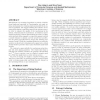13 search results - page 2 / 3 » Enhancing Privacy with Shared Pseudo Random Sequences |
CTRSA
2009
Springer
13 years 11 months ago
2009
Springer
Abstract. A redactable signature scheme for a string of objects supports verification even if multiple substrings are removed from the original string. It is important that the re...
SOUPS
2009
ACM
13 years 11 months ago
2009
ACM
Randomness is a necessary ingredient in various computational tasks and especially in Cryptography, yet many existing mechanisms for obtaining randomness suffer from numerous pro...
PERCOM
2009
ACM
13 years 11 months ago
2009
ACM
—Privacy protection is increasingly important during authentications in Radio Frequency Identification (RFID) systems. In order to achieve high-speed authentication in largescale...
ACSAC
2006
IEEE
13 years 10 months ago
2006
IEEE
Information leakage through covert channels and side channels is becoming a serious problem, especially when these are enhanced by modern processor architecture features. We show ...
ACSAC
2010
IEEE
13 years 2 months ago
2010
IEEE
Spread spectrum techniques such as Direct Sequence Spread Spectrum (DSSS) and Frequency Hopping (FH) have been commonly used for anti-jamming wireless communication. However, trad...

